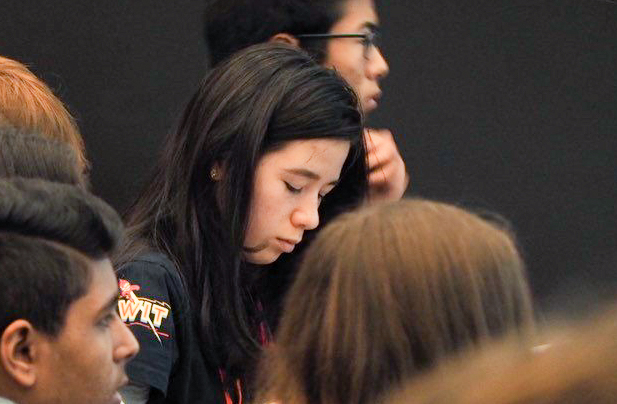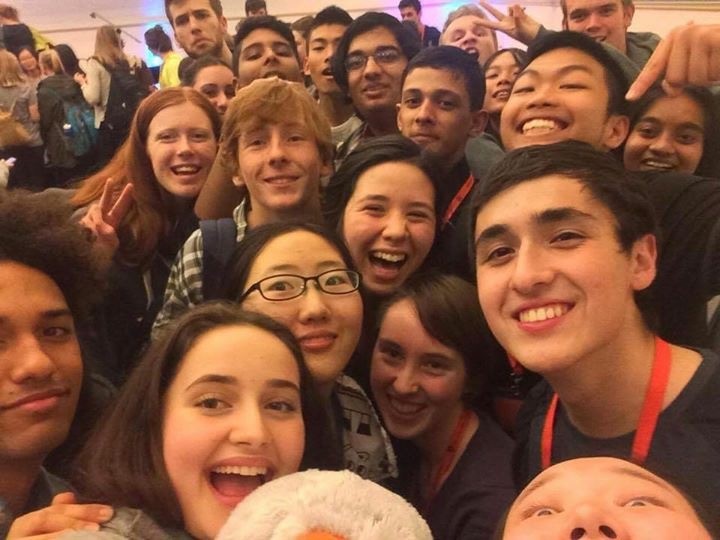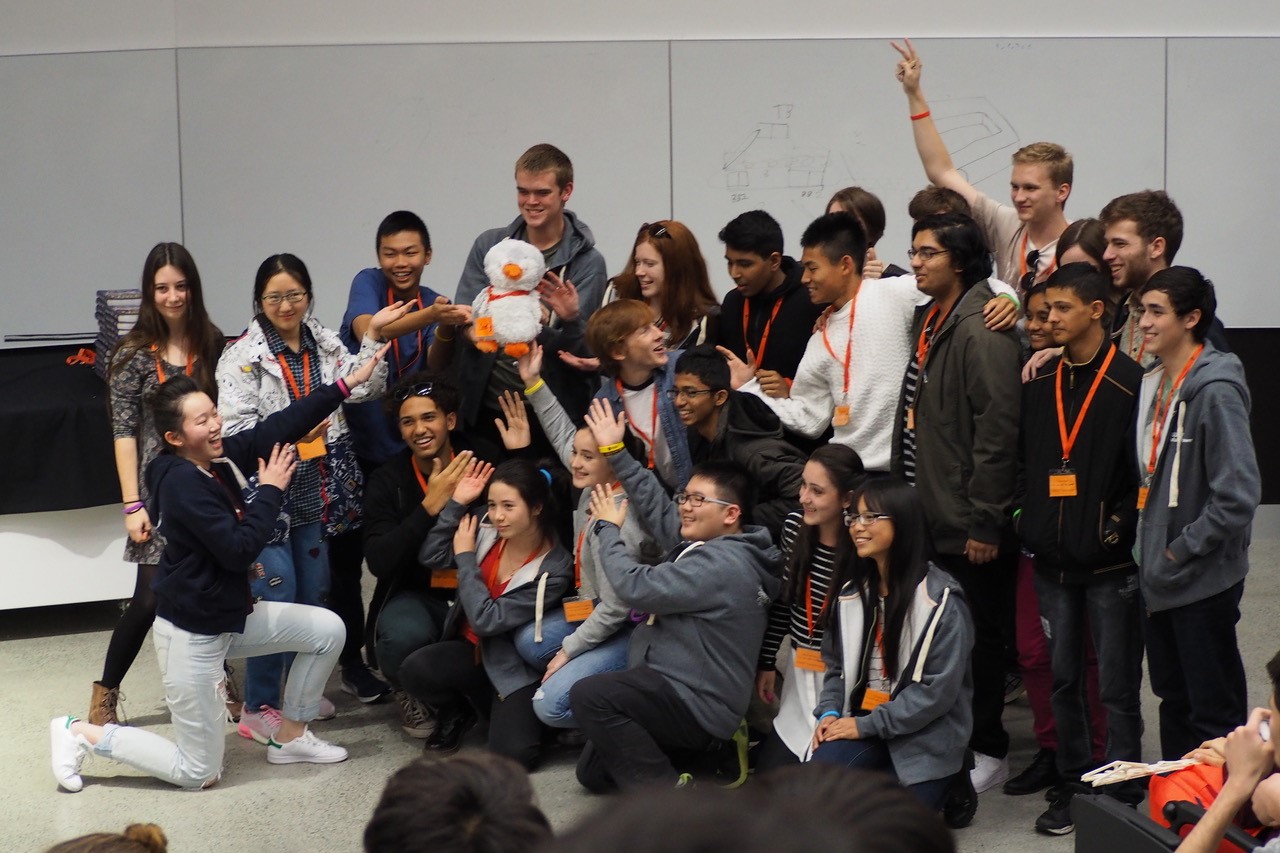Mikayla Stokes

Mikayla Stokes attended the Professor Harry Messel International Science School in 2017. Read her reflections upon returning on how the trip introduced her to science communication.
I had the privilege of attending the prestigious Harry Messel International Science School (ISS) along with 144 other students from around the globe. Over the course of these two fun-filled weeks, I learnt about the issue of future power through a series of lectures from top scholars in this field from both Australia and around the world. We were introduced to the impact that solar, fission, fusion, biofuels and batteries will have on how our future will be supplied with power, and what we can do to help advance it further.
I have always had a great love for science and being able to make things to solve a problem. I enjoy making science projects and robots in my spare time. In the future, I would like to become a mechatronics engineer. During my time at the ISS, I was introduced to the career path of science communication through multiple lecturers and guests such as Dr Karl, the “Australian version of Bill Nye”, and some past ISS alumni. I volunteer and lead the robotics workshop for OMG Tech! - an organisation that encourages kids to delve into the world of technology and science. However, I never considered this as a potential career. This has opened up more possibilities of things I could study conjoint with my engineering degree.
Another valuable feature of the ISS is the availability to get university advice from the “staffies”- past ISS alumni who look after all the students. They are all going through university right now, and many are studying engineering and science degrees. The advice I have received from them about what I want to study in the future has been invaluable and as a result, I am now more confident in what I want to do and my future seems much less daunting. This has shown me the wide range of support and opportunities within the STEM sector and careers in science. It has inspired me to want to go back and be a staffie for the next ISS. I would love to help make a difference and support these students with their future in science in any way I can, just like my staffies did for me.

One particular lecturer I enjoyed was Dr Jenny Gerbi, a Programming Director at Advanced Research Projects Agency-Energy in the United States of America. Her lecture was quite different from the others. She talked less about the science of how these future systems are going to work, but rather on how innovation and business will impact future power, and her experience going from studying science subjects in high school, to the job she has now. I enjoy learning about the mechanics of how things work, but I also love the idea of the processes that it went through to be developed and improved and later brought to market. Her lecture was no less informative than any of the other university lecturers despite not focusing on science and mathematics. I found it to be one of the most intriguing and engaging lectures, as she gave this unique perspective that no one else had really covered. Everything that she talked about that would help combat this issue, from start-ups, to innovation, is exactly what I would like to study at university, and showed me the significance and impact it has on the future.
The activity I enjoyed the most was the science and engineering challenge, run by the University of Newcastle. This is a national STEM outreach programme that is run throughout schools all over Australia. I have never gone through a programme anything like it in New Zealand. We got to build bridges, wire up power grids, build robotic rovers, make our own communication codes and so much more. The whole day we got to work with a small team of fellow ISS students to solve these individual problems. I loved the creative and innovative environment - everyone was so supportive, and kept building and building off each other’s ideas and suggestions. I feel like I got a sense of what it is like to work on projects in teams in our future careers, which was an amazing and exciting experience.
This programme has not particularly changed how I feel about science, but rather inspired me to keep using it to make the world a better place, and to keep experimenting and making things. A key thing I have gotten from this experience, is getting my “spark” and inspiration back to make and learn new things in the world - simply being curious. Since I have started high school, the past few years I have not had as much time or the commitment as I would like to make random projects and learn new things outside of school. But I have realised that if I want to make or learn something, I can do it. There is nothing holding me back. The support is there, the resources are there, all it needs is a little bit of my time and energy. I already have many ideas of projects that I can’t wait to start later this year and in the future. This network has shown me what a difference I am able to make in the world, and now I have my inspiration back to go and create random things to solve problems in the world.

Another thing that I have enjoyed while on this incredible journey, was being able to somewhat go through the “uni-student experience”. The independence we had on this trip allowed us to be able to learn however much we wanted. Many of us usually feel restricted and constrained at school about the extent of what we can and cannot learn. Here at the ISS, there is no limit to knowledge, and our curiosity is encouraged to discover as much as we possibly can.
Overall, what I have loved the most about this amazing experience was getting to meet other like-minded and talented students who all love science and technology as much as I do. We all felt comfortable being able to talk about our passions and what we like about STEM in this encouraging and supportive scene. Talking about ridiculous ways science is going to change the world, and too many math jokes and chemistry puns to count. It is a completely different experience to high-school life, where not many of my classmates enjoy the same subjects I do, and I don’t really get to talk about my “sciencey” interests as much. Over this fortnight, I have made so many invaluable and supportive friendships that I am sure will last for a very long time. We will likely see each other in the future, where we will be able to share and contribute our ideas. This network we have made has opened me up to a wide range of support, friendship and encouragement to keep pursuing science. It is great to know there are others out there like myself, and I can’t wait to bump into some of them in the future due to the great love of science we all share. Science has always supported us, inspired us, and constantly helps us push forward and make a change in the world. I am immensely grateful for the opportunity that the Royal Society and the ISS has provided me, and can’t wait to see what me and my fellow ISS friends are going to accomplish in the future and how we will change the world.
